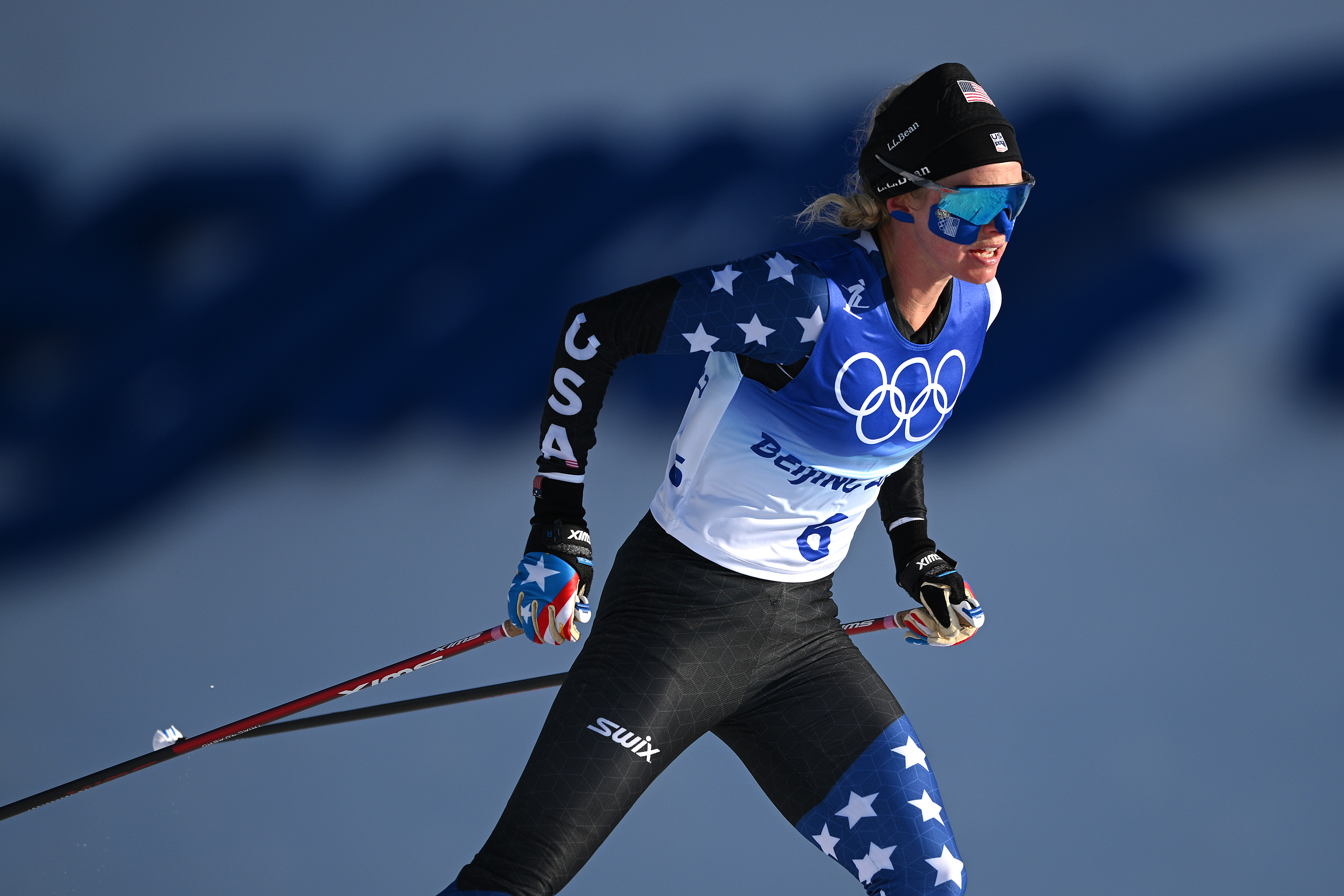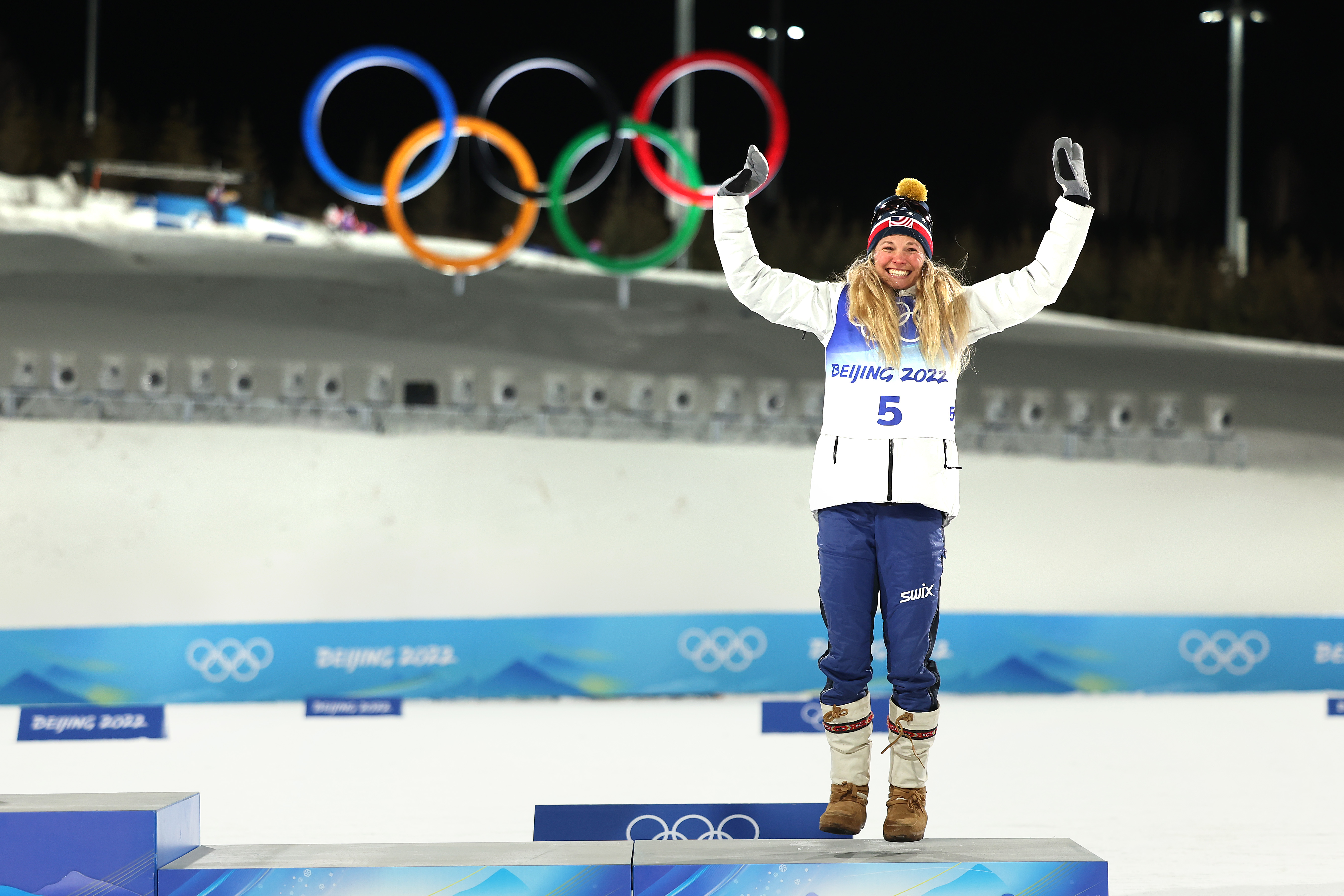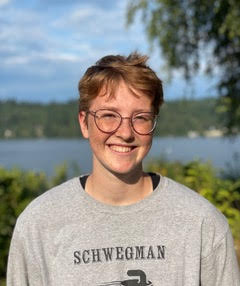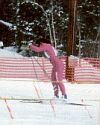Olympic Report: Skiathlon and Freestyle Sprints Recap
After three days of racing in challenging conditions at altitude, the first Olympic cross country medals of 2022 have been awarded, and many historic performances have already taken place. Most notably for the Americans was the first ever women’s individual Olympic medal in cross country skiing by Jessie Diggins in the freestyle sprint, with teammate Rosie Brennan just outside the medals in fourth. The other races were equally dramatic; both the men’s and women’s skiathlon events took place in blisteringly cold and windy weather, with temperatures in the single digits and snow cold enough that gliding was a challenge.
15/30km Skiathlon
In the women’s skiathlon, the high winds made drafting important, but didn’t stop Therese Johaug of Norway from pushing the pace and splitting the field apart. The race was quick from the start, with the front pack dwindling within the first five kilometers. Sweden’s Frida Karlsson joined Johaug at the front near the beginning of the race, as did American Rosie Brennan. By the time the athletes reached the exchange zone at 7.5 km, however, things looked a bit different. Johaug, Karlsson, and Finnish skiers Krista Parmakoski and Kerttu Niskanen left the stadium on their skate skis as a group, with Ebba Andersson of Sweden, Natalia Nepryaeva of the Russian Olympic Committee (ROC), and Teresa Stadlober of Austria close to 15 seconds behind. American Jessie Diggins came into the exchange 57 seconds behind the leaders in 10th place after a tough classic portion, looking to make up time in the freestyle.
By the end of the third of four laps, Johaug was skiing alone at the front of the field with a 35 second gap to Karlsson, Niskanen, Nepryaeva, and Stadlober—the four had formed a chase group, exchanging leads after reeling Karlsson back in from an early attack. Not far behind was Diggins, sitting in seventh place with a 1:12 gap to Johaug. On the final climb of the lap, Johaug continued to push the pace, widening her gap to the chase group whose skiers were now attacking each other. Heading into the last kilometer, Stadlober followed Nepryaeva as she put the pressure on, putting time into Kalrsson and Niskanen.
As Johaug crossed the line in first place, celebrating her first ever Olympic gold medal, Nepryaeva and Stadlober were battling for the silver and bronze in a sprint to the end. Ultimately, Nepryaeva placed second, earning her first ever individual Olympic medal, and Stadlober finished just behind. Four years after missing out on a bronze medal after taking a wrong turn in Pyeongchang, Stadlober was able to claim that medal she was looking for in 2018. Not long after, Diggins crossed the line in sixth place, posting the fastest freestyle time of the day. Brennan was not far behind, finishing in 14th place after fading a bit since her strong start. American teammates Hailey Swirbul and Julia Kern finished 40th and 53rd, respectively.

Though the men’s skiathlon also took place in frigid conditions, the wind died down enough to make for a less tactical race. Mental toughness and consistent pacing were crucial to good performances. Athletes completed eight laps of the 3.75 km course, four classic and four freestyle. With Simen Hegstad Krüger of Norway, the defending champion in this event, unable to race due to a positive Covid test, victory in this race was especially up for grabs. Knowing that the initial 15 kilometers were where he needed to put time on the field, Finnish classic specialist Iivo Niskanen made the first move. Alexander Bolshunov of the ROC was the only one to follow, and the two gradually skied away from the rest of the field. By the 10 kilometer mark, Bolshunov and Niskanen had an 18 second gap to the next group, which was led by Denis Spitsov of the ROC with Norwegians Paal Golberg and Hans Christer Holund right behind.
At the transition to skate, the leaders were 30 seconds ahead of Spitsov, who had opened up an eight second gap on the Norwegians. Although Bolshunov and Niskanen left the stadium together after quick transitions by both, Niskanen was dropped right away as Bolshunov put the pressure on. Spitsov also caught Niskanen fairly quickly, and the gold and silver seemed fairly secure with large gaps between the top three skiers. The bronze, however, was still up for grabs. With just two laps to go, Bolshunov led Spitsov by 47 seconds, with Niskanen 1:26 back and Holund behind by 2:06. By this point in the race, Holund had dropped Golberg and picked up the pace, trying to chase down Niskanen. Meanwhile at the front of the race, Bolshunov was approaching the final kilometers with no chasers in sight.
In a time of 1:16:09, Bolshunov finally crossed the finish line, carrying the ROC flag across the line in celebration. After earning four medals at the 2018 Olympic Games but never quite reaching gold, he proved in this race that he has what it takes to stand on the top of the podium, taking a decisive 71 second win over second place. Although Bolshunov posted strong results early in the season, he clearly timed his training well to peak for the Olympics, improving as the months went on and delivering the win in Beijing.
Next across the line was Spitsov, recovering quickly from a fall in the feed zone to finish in the silver medal position. The Norwegian team was unable to land any athletes on the podium, almost unheard of in a distance event, with Niskanen holding on to the final podium position to take bronze ahead of Holund, fourth, and Golberg, fifth. Although Niskanen has medalled at the Olympics before, his effort in the freestyle portion of the race was notable given his tendency to perform better in the classic technique. Scott Patterson was the highest American finisher, demonstrating his incredible endurance by advancing eight places in the freestyle leg to take 11th place. Gus Schumacher was the only other American in the race and finished 39th.
Freestyle Sprints
With temperatures slightly warmer for Tuesday’s sprints, races picked up the pace for a 1.5 kilometer freestyle sprint. For the qualifier event, the air temperature was at around 22 degrees, a significant increase from previous race conditions. In the women’s race, Jonna Sundling of Sweden looked the strongest by far, winning the qualifier by just over five seconds. The rest of the usual favorites were scattered in the top 10, with Brennan posting the second fastest time, Diggins fifth, and Sweden’s Maja Dahlqvist sixth. Kern also had a strong qualifier, placing 14th to advance to the quarterfinals, while American teammate Hannah Halvorsen was unable to advance, placing 43rd. There seemed to be some extra nervous energy in the heats; Sundling jumped the gun to cause a false start, and Brennan stumbled before leaving the opening tracks. Brennan recovered impressively quick, however, and made her way into second position behind Sundling to advance. Dahlqvist advanced easily in her heat, as did Diggins, though Nepryaeva just missed the second spot in her quarterfinal.
In the first semifinal, everyone wanted a chance at the lucky loser times, and no one let up on the pace. Brennan opted to start at the back and work her way up, while Dahlqvist and Sundling took to the front. The second hill was where the order changed, with Nadine Faehndrich of Switzerland moving into second position and Brennan sitting in fourth. Maintaining her dominance, Sundling won easily, with Faehndrich holding on to second. Dahlqvist came in third, showing her first sign of weakness in a sprint all season, with Brennan in fourth. The round was fast enough for all four to advance, however. In the second semifinal, Diggins employed a similar strategy to Brennan’s, starting near the back but quickly working her way up. On the final climb, Emma Ribom of Sweden was matching Diggins, but came around her before the last stretch. Diggins held on to second position behind Ribom to advance.
In the final, the three Swedes all went out front with Diggins just behind in fourth. Nearly halfway into the race, Sundling showed the field that no one was on her level, skiing away from the pack and gaining a decisive separation. The fight for silver was on, with Diggins, Brennan, Dahlqvist, and Faehndrich all skiing very close together. In the final straightaway, Dahlqvist proved that she’s still one of the best sprinters out there, saving enough to take silver and finishing just ahead of bronze medalist Diggins. Brennan finished close behind, just missing a medal, with Faehndrich in fifth followed by Ribom in sixth.

In the men’s race, all eyes were on Johannes Klaebo of Norway. Although he hasn’t lost a freestyle sprint this season, after a subpar 40th place performance in the skiathlon, things looked a little more uncertain. Klaebo placed third in the qualifier, with Sergey Ustiogov of the ROC in second and Lucas Chanavat of France in the top spot. All four American starters qualified for the quarterfinals, led by JC Schoonmaker in 13th. Ben Ogden qualified 19th, Kevin Bolger 22nd, and Luke Jager 30th. The first quarterfinal was fairly stacked with Klaebo, Ustiogov, and Oskar Svensson of Sweden racing. Klaebo delivered a decisive win, with Ogden moving into fourth after Frenchman Renaud Jay went down on the final corner. Federico Pellegrino of Italy and Chanavat, some of the medal favorites, qualified easily in the second quarterfinal. In the fourth heat, Chinese athlete Qiang Wang dominated the race alongside Norwegian Erik Valnes, perhaps a surprise to many given that Wang hasn’t competed on the World Cup since 2019. After being disqualified for an obstruction, however, Wang was unable to compete in the semifinals and was relegated to 30th place, allowing Ogden to race as a lucky loser.
The first semifinal raced more like a final with the likes of Klaebo, Pellegrino, Ustiugov, and Chanavat all together. As usual, Chanavat led the group initially, but the effort cost him and he was unable to stay in qualifying position in the latter half of the race. Klaebo used his usual tactics, sitting at the back and accelerating quickly to the front on the final hill. In a very tight four-way finish, Pellegrino and Klaebo bested Ustiugov and Richard Jouve of France to take the top two spots, keeping the others out of the final in the slower of the two semifinals. The second semifinal was led immediately by Artem Maltsev of the ROC, who didn’t hold back on the first climb and created some separation from the group. He didn’t quite have what he needed to keep it, though, and Alexander Terentev of the ROC took first with Finland’s Joni Maki second. Likely due to his early efforts to push the pace, Maltsev advanced as a lucky loser along with Svensson.
The final was a bit unusual tactically—Klaebo led the pack from the start, with Pellegrino latching tightly to the next spot. The order changed little throughout the race, with Terentev sitting third and Maki fourth. Coming into the line, it looked as if Pellegrino may have had the extra gear to beat Klaebo, but in the end it was the Norwegian who took home the gold. Pellegrino was visibly elated to earn silver in one of the closest men’s sprint finishes all season, and Terentev claimed the bronze in third.
Classic Distance Preview
- February 10: Women’s 10km Classical (1:00 am CST)
- February 11: Men’s 15km Classical (1:00 am CST)
Next up in Olympic cross country skiing are the classic distance events. In the women’s race, Johaug will surely be looking to add another gold to her medal collection, though she may have challengers in the likes of Nepryaeva and Karlsson, who showed strong form in the skiathlon and have the past results to back it up. Although Diggins is not typically a classic specialist, coming off of a medal in the sprint she may have the extra boost she needs to contend for a medal. Brennan also has a good chance of placing high, having raced well in her first two events and likely searching for redemption after the sprint. On the men’s side, Niskanen is a heavy favorite to win, though Bolshunov is also looking strong. The Norwegians will surely be looking for some more medals as well after a disappointing performance in the skiathlon.
 |
About the author... Erika Peterson is a senior at South High School in Minneapolis. She skis for Loppet Nordic Racing as well as her high school team. When she’s not out on the trails, you can find her listening to Lorde and creating oatmeal recipes. |

